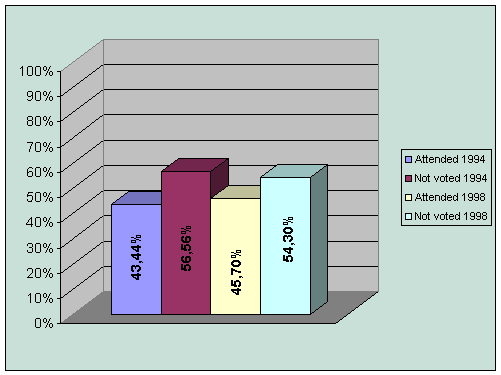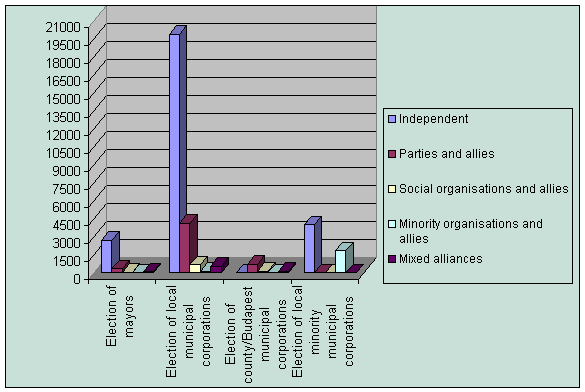
The territory of the Republic of Hungary is divided into
the capital, counties, towns and villages. The communities of the voters in
villages, towns, the capital and its districts, and in the counties are vested
with the right of local self-government, i.e. the independent and democratic
administration of local public affairs affecting the community of the voters,
and the exercising of local public authority in the interest of the population.
Voters exercise local self-government through the municipal corporation elected
by the citizens as well as through local referenda.The national and ethnic
minorities living in the territory of the Republic of Hungary constitute part of
the body politic, enjoying, among numerous other rights, the right of
establishing local and national municipalities.Within the meaning of the
Constitution of the Republic of Hungary, the election of the members of the
municipal corporation and of the mayor shall be held in the month of October in
every fourth year. The President of the Republic shall set the date of the
election.The municipal election is held with the purpose of forming the new
municipalities in the settlements, the counties and in the capital, and the
election of the local minority municipalities.The municipal election is a
single-round election, constituting different elements for each type of
settlement, according to the country’s settlement structure.
Electing the members of local municipal corporations
a) In settlements of a population not exceeding
10,000, the voters of the settlement elect the members of the local municipal
corporation on a so-called ‘small list’. At the voting, the names of all
candidates are listed on the ballot-paper in alphabetical order, and voters may
vote for at most the number of candidates equalling the number of candidates
eligible in the settlement (the vote is valid, however, if the voter has voted
for fewer than the maximum possible number of candidates!). The number of
eligible candidates is specified on the ballot-paper.
The candidates receiving the highest number of votes shall become the elected
members. In the event not all mandates can be allocated due to a tie vote,
mandates are allocated by lot. If fewer than the number of eligible candidates
are elected, by-elections must be announced for the unallocated seats.
b) In settlements of a population exceeding 10,000 and in the
districts of the capital, voters of the settlement elect the members of the
local municipal corporation under a mixed electoral system. That means that app.
60 and 40 percent of the mandates are allocated, respectively, in single-member
constituencies and from a compensatory list.
The territory of the settlement is divided into single-member constituencies,
whose number is provided for by the law. A single candidate may be elected in
each constituency. The candidate receiving the highest number of votes shall
obtain the mandate. In the event of a tie vote, the election is inconclusive and
by-elections are held.
The nominating organisations may obtain mandates on the basis of the surplus
votes accrued in the single-member constituencies. Compensatory lists may be
started by those nominating organisations, which have put up a candidate in at
least one-fourth of the single-member constituencies.
Electing the mayor
In each settlement, the mayor shall be elected by the majority method, i.e. the
candidate obtaining the highest number of votes becomes the mayor of the
settlement. In the event of a tie vote, the election is inconclusive, and
by-elections are held. Each voter may vote for one candidate for mayor.
Electing the members of the county municipal corporation
Members of the county municipal corporation shall be elected in two
constituencies. The settlements of a population not exceeding 10,000 constitute
one constituency, while the settlements of a population exceeding 10,000
constitute the other one. Voters of the county towns – since the legal status
of their settlements is identical with that of the county – shall not
participate in the election of the members of the county municipal corporation.
The number of mandates to be obtained on the county list is specified by the law
for both constituencies, according to the population of the county.Each voter
may vote for one list.Lists not having reached more than 4 percent of the total
number of valid votes cast in the constituency shall not participate in the
allocation of mandates.
Electing the members of the municipal corporation of
Budapest
The voters of Budapest elect the 66 members of the municipal corporation of
Budapest on a list basis. Each voter may vote for one list.Lists not having
reached more than 4 percent of the total number of valid votes cast in the
constituency shall not participate in the allocation of mandates.
Nominating and electing the mayor of Budapest
The electorate of Budapest shall elect the mayor by the majority method, i.e.
the candidate obtaining the highest number of votes becomes the mayor of
Budapest. In the event of a tie vote, the election is inconclusive, and
by-elections are held.
Electing the municipal corporations of the national and ethnic minorities
Apart from two other possibilities, the local minority municipality of the
various national and ethnic minorities may be established directly, i.e. the
voters establishing it by election. The local minority municipal elections, held
only in those settlements, where such elections were initiated, is held on the
day of the general election of the members of local municipal corporations and
mayors. There are preferences linked to the election in order to ensure the
participation of national and ethnic minorities in the local formation of public
life.
Participation in 1994 and 1998

The
distribution of mandates at the 1998 municipal elections
